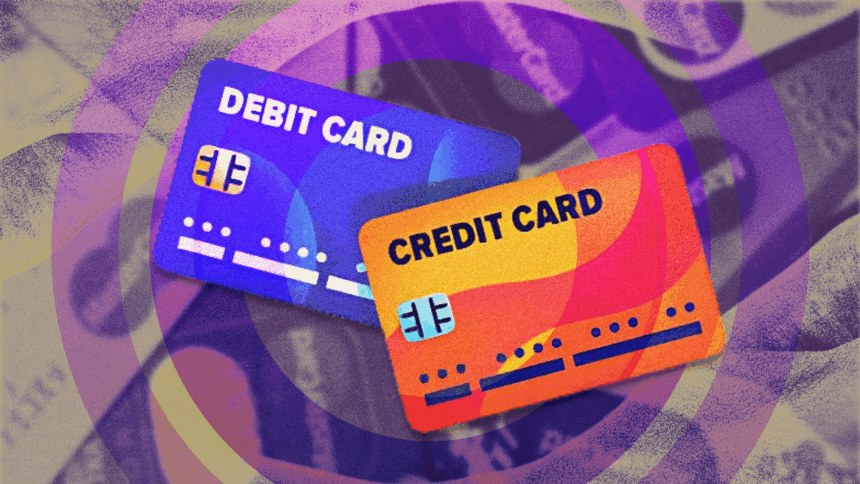A big part of adulting is managing finances, and choosing what card to use to keep your money safe is a decision that can cost you everything.
Credit cards and debit cards are often interchangeable. Although they both have an impact on your spending habits and financial security, they work in very different ways.
When a debit card is used, it spends the money you have deposited at the bank. Meanwhile, credit cards let you borrow money until a specific limit to purchase items, which you can pay back later.
Understanding their key differences can help you make smarter money choices, avoid being in a debt hole, and build stronger financial foundations. Here are the pros and cons of credit and debit cards to help you pick the right one for you.
Debit Card
Debit cards allow the spending of money directly from your checking or savings account at the time of purchase. It also does not involve the element of borrowing money, unlike credit cards, and having insufficient money available in the card can result in a transaction decline or overdraft fee.
Despite debit cards functioning like credit cards for purchasing items, they will only let you spend the money you have.
There are three main types of debit cards:
- Standard debit cards. This is the most commonly used type since they are linked to your bank account
- Electronic Benefits Transfer (EBT) cards. This is issued by government agencies and used for benefits for approved purchases
- Prepaid debit cards. These are loaded with a fixed amount of money without being linked to a bank.
Pros of Debit Cards
Avoiding Debt. Since debit cards only spend your money stored in your own card, this helps you avoid racking up debt. It is also easier to stick to a budget, letting you be a more mindful spender.
No Annual Fees. Most debit cards come with no annual fee and allow free withdrawals from your bank’s Automated Teller Machine (ATM). On the other hand, credit cards may charge annual fees, cash advance fees, and high interest rates.
Early start. Debit cards are available for kids and teenagers, but they may need parental help during the application process, especially for income-related forms.
Cons of Debit Card
Weak security. If your debit card is stolen and you report late, your liability for unauthorized charges can range up to a large amount of money. Debit cards generally offer less fraud protection than credit cards, so it is better to avoid using them for online purchases.
No Rewards. Unless you’re using a rewards checking account, debit card purchases typically do not earn points, miles, or cash back, which are good assets to save money.
Doesn’t Build Credit Score. Using a debit card won’t help build your credit. To establish a credit history, lenders need to see that you can responsibly repay what you borrow—something debit cards cannot do due to not having a borrowing feature.
Credit Card
A credit card lets you borrow money, from a bank or lender, to make purchases, transfer balances, or withdraw cash.You will get a credit limit, which is the maximum amount of money you can borrow.
Instead of drawing directly from your bank account like debit cards, you are using the bank’s money and consenting to pay it back later—ideally monthly.
There are many types of credit cards, including standard cards, premium cards, reward cards, balance transfer cards, secured cards, and charge cards.
Pros of Credit Card
Delayed payment for purchases. Credit cards let you delay payments, which is useful for emergencies or big purchases especially with the help of a borrowing feature, providing short-term financing.
Build credit history. By making on-time payments, a credit card can help you build a credit history and improve your credit score. A good credit score is needed for securing loans, such as car loans or mortgages.
Cashback and rewards. One of the biggest benefits of credit cards is rewards programs—cashback or extra points for purchases, such as airfare, gas, or entertainment, to get maximum value from your spending.
Fraud protection. Since credit card purchases do not automatically withdraw money from your bank account, they provide an added layer of protection against fraud compared to debit cards.
Cons of Credit Card
Overspending and debt. Credit cards come with a set limit when borrowing money. Since credit cards have a balance month to month, it is easy to overspend, and over time, it leads to debt.
Interest Adds Up. If you don’t pay your full balance each month, interest charges apply. The longer you carry a balance, the harder it becomes to pay the amount.
Piling up late fees. Missing or delayed payments can lead to high additional fees to pay—they are separate from the interest fees as well.
The Federal Reserve Service’s 2024 Diary of Consumer Payment Choice revealed that 30% of consumers used debit cards for payments and 32% used credit cards. Meanwhile, cash was used in just 15% of transactions. This shows that the difference between people preferring to use both credit and debit cards is not that significantly apart.
Choosing between a debit card and a credit card ultimately depends on you—your financial habits, goals, and needs.
At the end of the day, money is money, and you are the one responsible for each decision you make in spending them. These tools exist to make you make smarter choices, so use them to your advantage.








